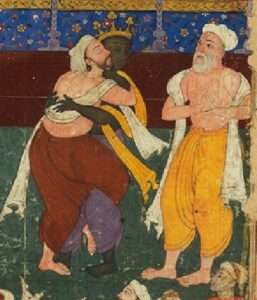The Deadly Embrace
Fourteen years had passed since the day they had come out of Hastinapura furious, kicking the stones they met in the street, and uttering the most terrible curses against Duryodhana and his friends; now they could return, as victors, to govern it. They had regained the kingdom that rightfully belonged to them, they had obtained their revenge, and yet they were not happy: how to rejoice in a kingdom regained in exchange for rivers of blood from relatives and friends?
The five brothers were sad. With the fire of hatred quieted, only the knowledge remained that they would now witness gruesome scenes of grief from mothers, wives and friends of the dead. It was a tragedy they never wanted to witness.
At that moment a messenger informed them that Dhritarastra and Gandhari were coming to find the bodies of their children, and they decided to wait for them.
When Yudhisthira saw his elderly uncle, he threw himself at his feet, asking for forgiveness. Moved by such kindness and humility, Dhritarastra embraced him, but without transport.
Then he said:
“Where is Bhima? I want to show him that I have forgiven him too.”
But just as the Pandava was about to come forward, Krishna stopped him and told him to wait.
What was going to happen?
At this point you need to know that on the night Asvatthama perpetrated the vile slaughter, Krishna was not sleeping in the Kaurava camp, but had gone to Hastinapura in order to prepare the ground for the meeting of the elderly uncles with the Pandavas. On that occasion He entered Duryodhana’s gymnasium and took with Him an iron statue perfectly shaped according to Bhima’s build, against which Duryidhana trained daily. Aware of Dhritarastra’s great pain and considerable physical strength, Krishna had always been concerned about the reaction he would have when he met Bhima.
So when Dhritarastra opened his arms, He pushed the statue against him. As soon as the old man felt the unmistakable physical form of his nephew in his arms, he could not hold back his hatred and pressed him impetuously until he broke it in two. Stained with his own blood, Dhritarastra thought he had killed the architect of the death of his children, but did not rejoice. That physical outburst had served to banish any unhealthy feeling from his heart.
“I killed Bhima,” he complained. “What have I done! My dear Bhima, the son of my beloved brother Pandu. I did not want to do it. He had killed my children only because they were evil and aggressors, he was not wrong. Why could I not restrain my hatred? He didn’t deserve to die.”
By letting off steam in this way, Dhritarastra let go of his grudge.
As soon as Krishna realized that the danger was over, he said:
“O king, Bhima is not dead at all. What you broke was just the iron statue your son used to train. Your grandson is still alive.”
Vyasa’s son was delighted and hugged him with sincere affection. Then he also embraced Arjuna and the twins.
But it remained to appease Gandhari, who possessed considerable powers developed thanks to the constant practice of the principles of yoga and austerity. It is good to remember that when she learned that the one who would become her husband was blind, Gandhari had blindfolded her eyes and from that day had not wanted to see anything. As soon as she touched Duryodhana’s body, her anger flared up, but strangely she did not react against the Pandavas.
“I have no doubt, O Krishna,” said the queen, “That all this was Your doing. It was You who wanted this war and these deaths, because you had a plan in mind. And to achieve this You protected the children of Kunti and Madri and condemned my children to die. Today, therefore, I know that if I am childless I owe it to You and not to the Pandavas, who acted as instruments in Your hands. From all the austerities I’ve performed if there is the slightest merit to collect, I will use it to curse You. Know that in thirty-six years Your family and Your entire dynasty will self-destruct, just like we did. And the women of Your house will cry just as You see us crying today.”
Only a smile came from the wonderful face of the Lord.
“This curse of yours is actually a blessing,” He replied. “Only the superior strength of so many austerities could have destroyed the Vrishni, who are invulnerable to any weapon. I therefore welcome your words as a help you have offered me, when my companions and I have to leave this world.”
This is a section of the book “Maha-bharata, Vol. 2”.
To buy the complete book, click above
Post view 232 times




Leave a Reply